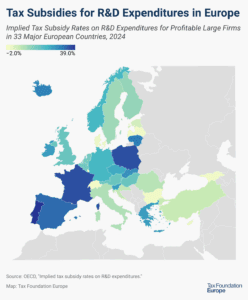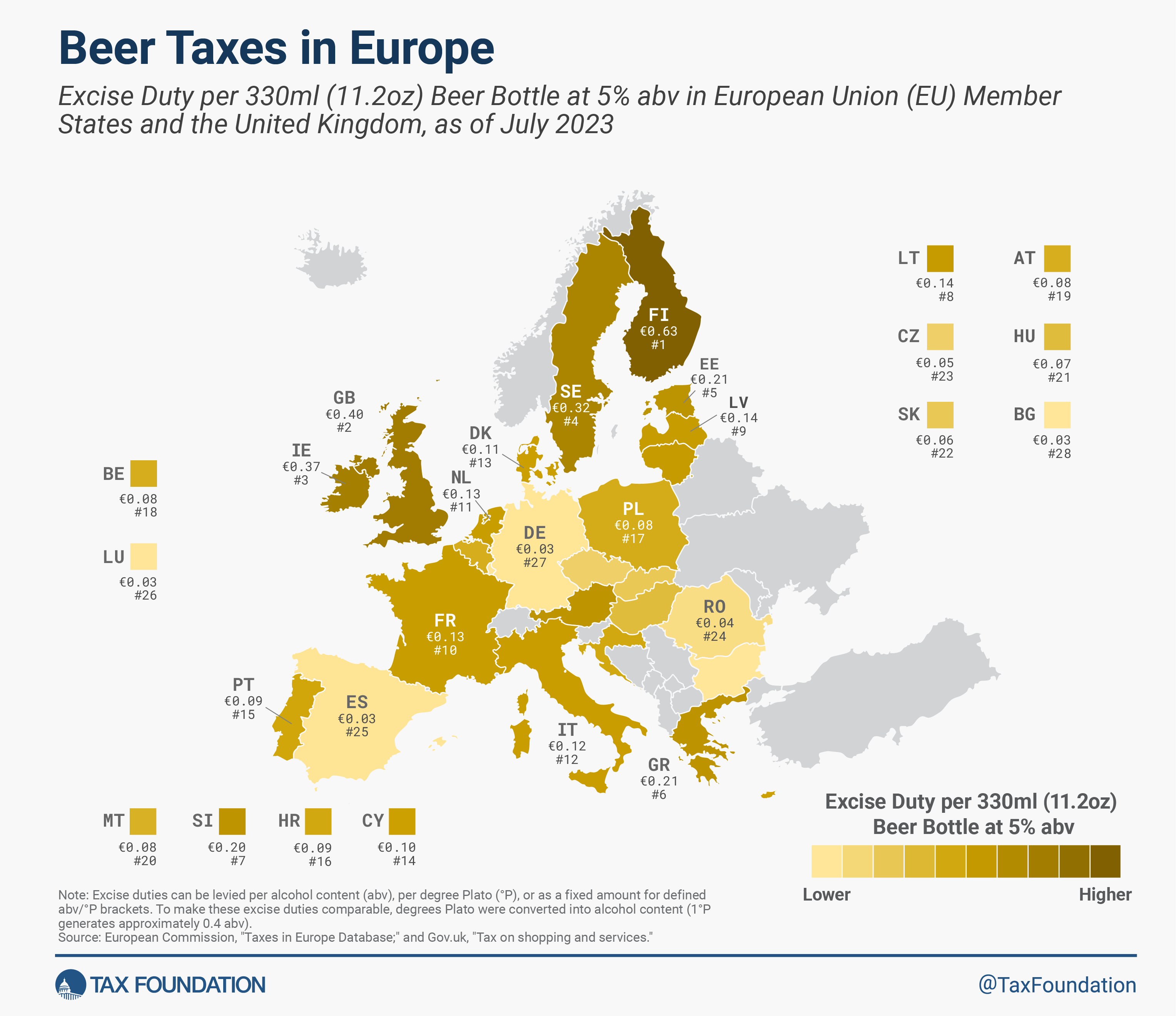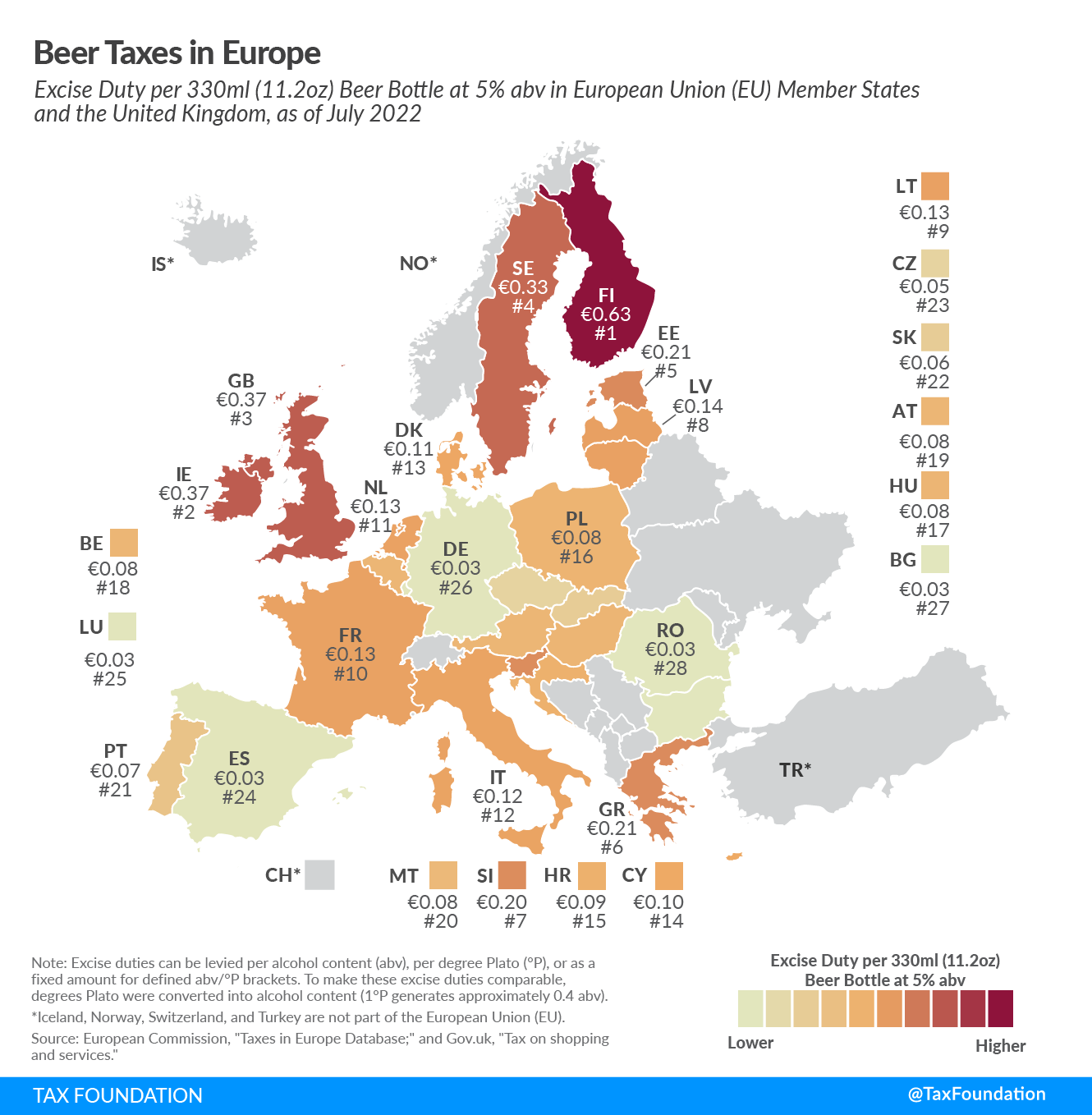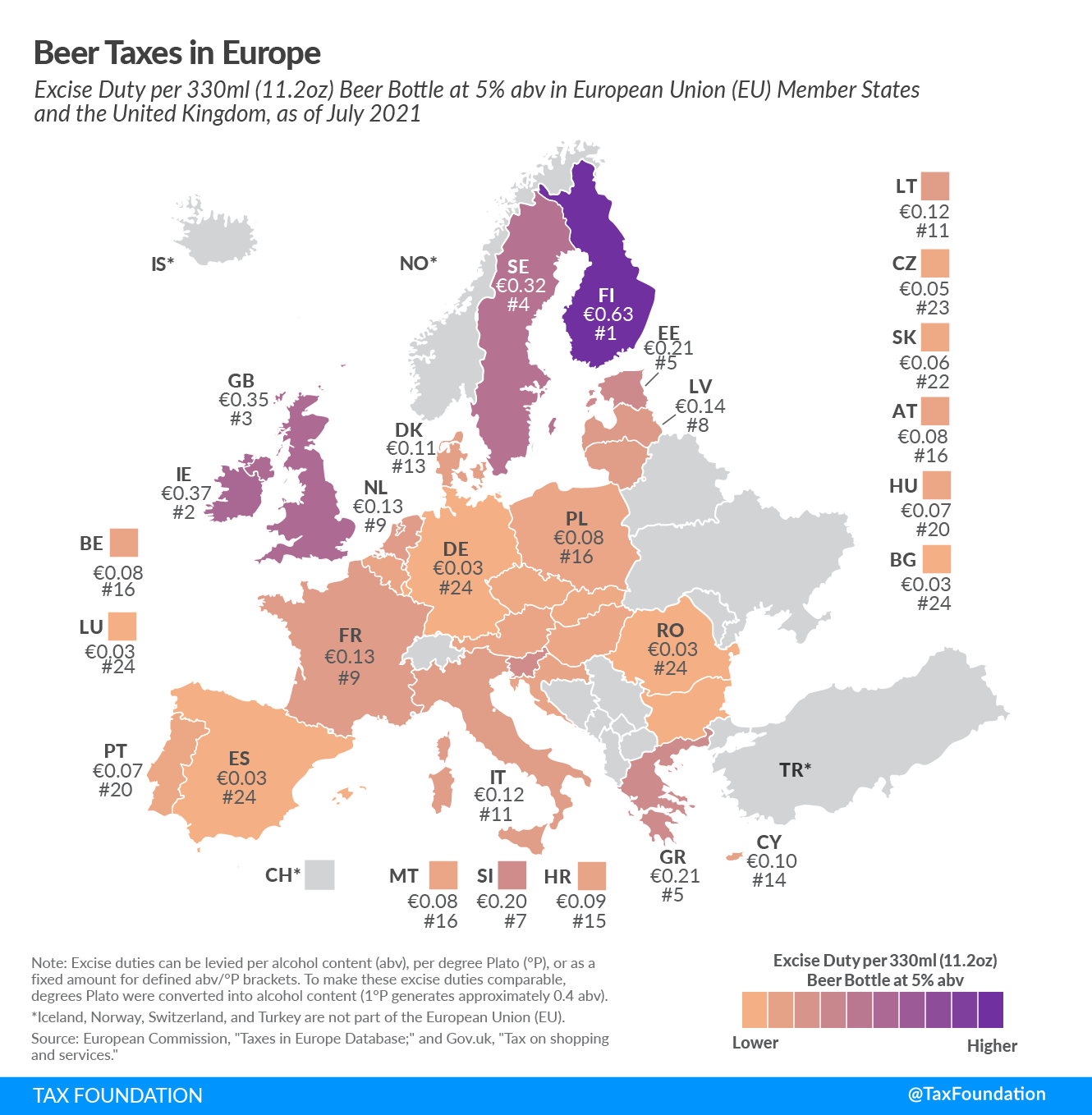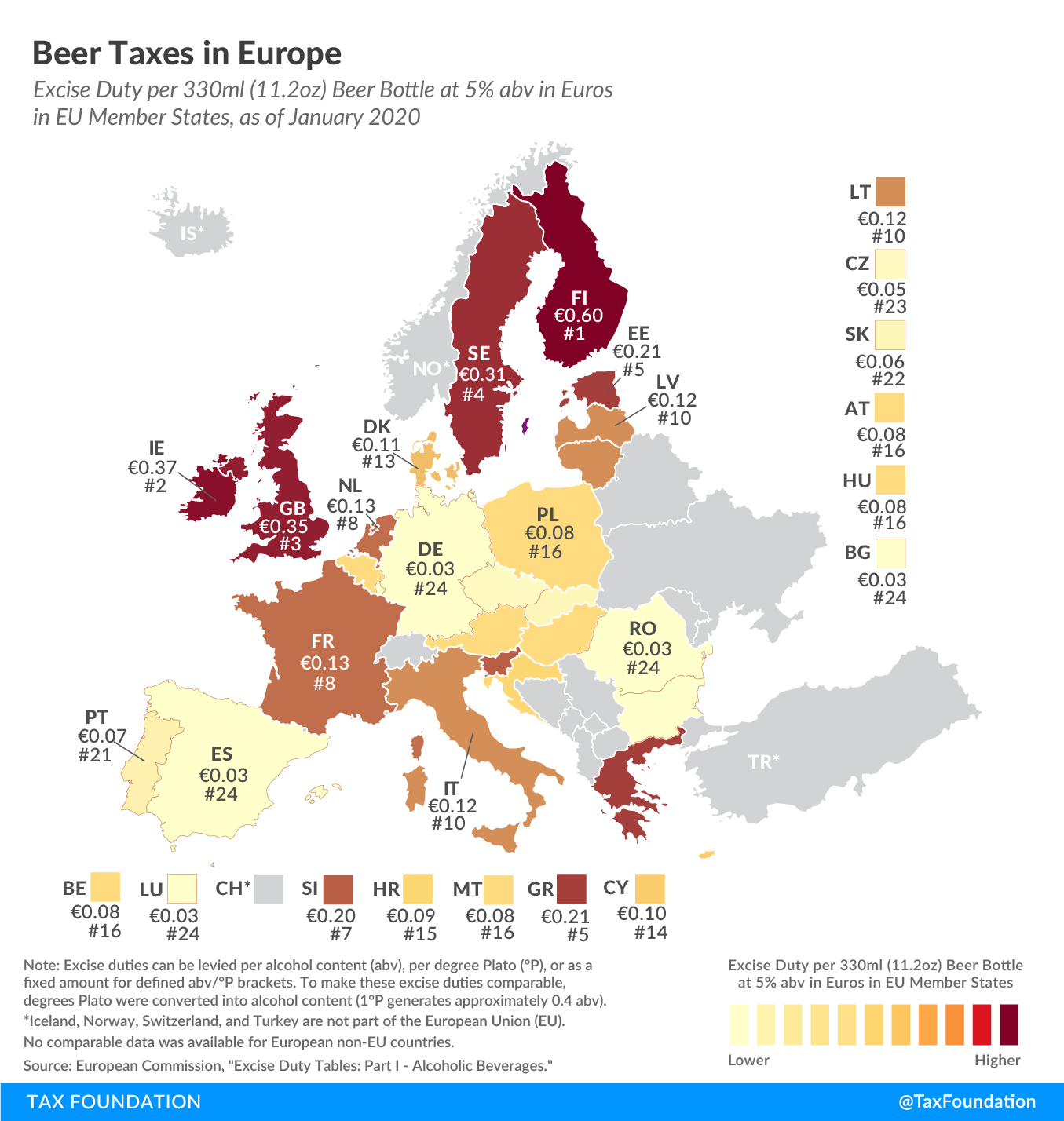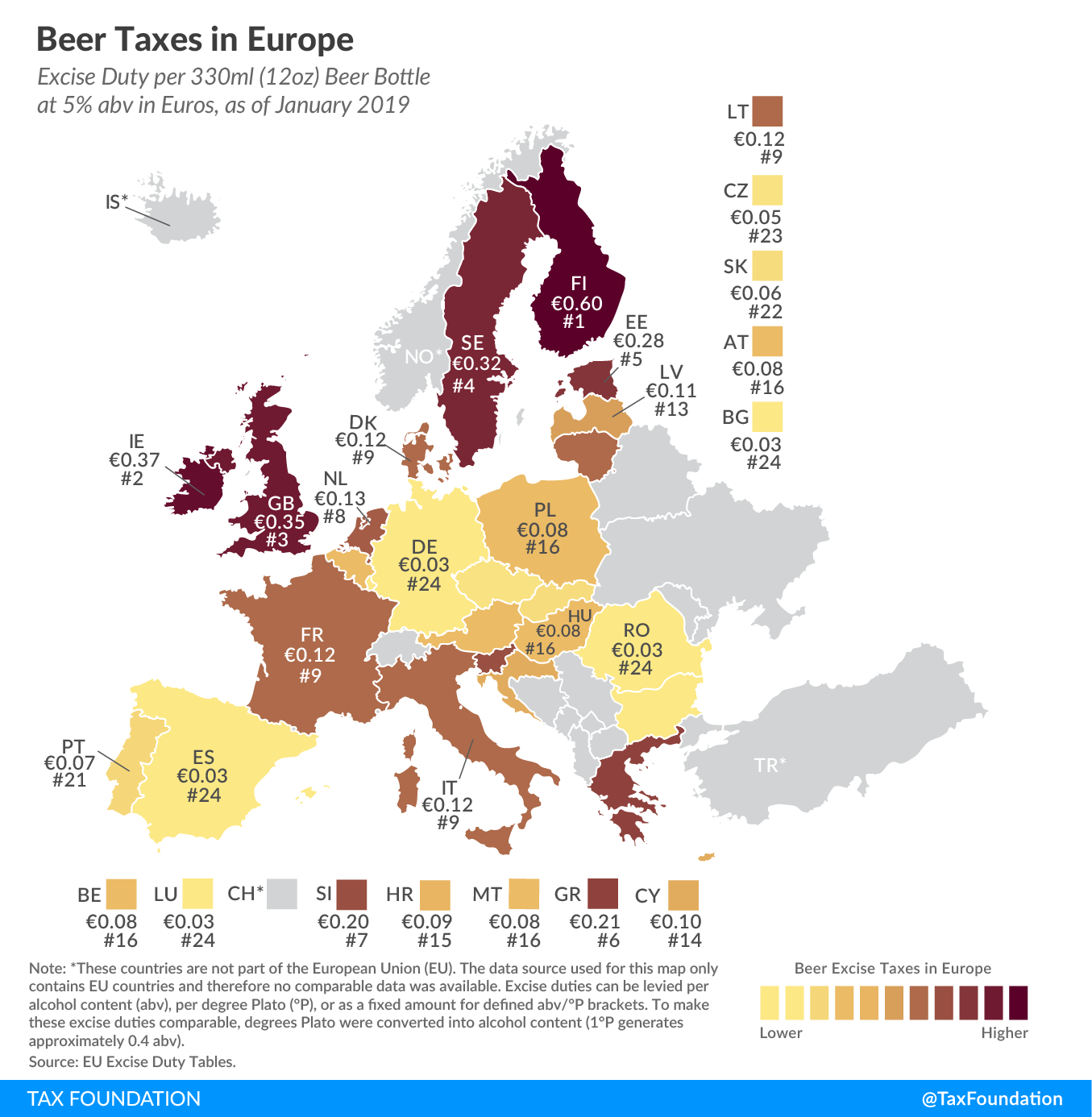
As Oktoberfest celebrations wrap up across the continent, now is a great time to examine beer taxes in the European Union. Hefty beer taxes add to the price of every drink consumed.
The EU requires Member States to levy an excise duty on beer of at least €1.87 per 100 liters (26.4 gallons) and degree of alcohol content. For a standard bottle of 330 mL (11.2 oz) of 5 percent alcohol content beer, this translates to a minimum taxA tax is a mandatory payment or charge collected by local, state, and national governments from individuals or businesses to cover the costs of general government services, goods, and activities. of €0.0309 ($0.0334). Only a few Member States remain near this minimum rate; most countries choose to levy much higher duties on beer.
Some countries vary their volume-based tax rate in proportion to alcohol content, and other countries set one rate for a range of alcohol content in beer. To allow for comparison, we convert the different rates to euros and apply those rates to a standard bottle of beer. EU countries also levy a value-added tax (VAT) as a percentage of the sales price, which is separate from the excise taxes and not included in the map.
The significant disparities in beer tax rates among EU Member States are representative of the wide range in the global tax treatment of alcohol. Finland levies the highest tax of €0.597 ($0.646) per 330 mL bottle of beer, followed by the United Kingdom at €0.413 ($0.447) and Ireland at €0.372 ($0.403). Bulgaria levies the lowest tax of €0.0316 ($0.0342) per bottle of beer, followed by Germany at €0.0325 ($0.0352) and Luxembourg at €0.0327 ($0.0354).
Beer Taxes in Europe, 2024
Excise Duty per 330ml (11.2oz) Beer Bottle at 5% abv in European Union (EU) Member States and the United Kingdom, as of July 2024
| Country | Excise Duty per 330ml (11.2oz) beer bottle and 5% abv in EUR | Ranking |
|---|---|---|
| Austria | € 0.0825 | 19 |
| Belgium | € 0.0827 | 18 |
| Bulgaria | € 0.0316 | 28 |
| Cyprus | € 0.0990 | 14 |
| Czech Republic | € 0.0540 | 23 |
| Germany | € 0.0325 | 27 |
| Denmark | € 0.1077 | 13 |
| Estonia | € 0.2201 | 5 |
| Spain | € 0.0329 | 25 |
| Finland | € 0.5973 | 1 |
| France | € 0.1313 | 11 |
| United Kingdom | € 0.4127 | 2 |
| Greece | € 0.2063 | 6 |
| Croatia | € 0.0876 | 17 |
| Hungary | € 0.0764 | 21 |
| Ireland | € 0.3721 | 3 |
| Italy | € 0.1233 | 12 |
| Lithuania | € 0.1561 | 8 |
| Luxembourg | € 0.0327 | 26 |
| Latvia | € 0.1485 | 9 |
| Malta | € 0.0796 | 20 |
| Netherlands | € 0.1340 | 10 |
| Poland | € 0.0928 | 16 |
| Portugal | € 0.0955 | 15 |
| Romania | € 0.0384 | 24 |
| Sweden | € 0.3247 | 4 |
| Slovenia | € 0.1997 | 7 |
| Slovakia | € 0.0592 | 22 |
Source: European Commission, "Taxes in Europe Database;" and Gov.uk, "Tax on shopping and services."
Changes from Last Year
- Estonia increased its excise duty on beer from €12.70 to €13.34 per hectoliter per alcohol content in January 2024, amounting to €0.01 more per drink.
- Finland decreased its excise duty on beer from €38.05 to €36.20 per hectoliter in January 2024, amounting to €0.03 less per drink.
- France increased its excise duty on beer from €7.82 to €7.96 per hectoliter per alcohol content in January 2024, amounting to €0.04 more per drink.
- Lithuania increased its excise duty on beer from €8.60 to €9.46 per hectoliter per alcohol content in January 2024, amounting to €0.014 more per drink.
- Latvia increased its excise duty on beer from €8.20 to €9.00 per hectoliter per alcohol content in March 2024, amounting to €0.013 more per drink.
- Several other EU countries experienced changes to their beer excise rate, either through legislated rate changes or changes in their currency exchange rate to euros, that changed the levied tax per drink by less than €0.01.
The motivations for excise taxes on beer are straightforward. Governments tax beer and other alcohol both to discourage people from consuming alcohol and to generate revenues from a broadly, but socially disdained, product. Beer taxes remain a blunt tool for reducing harm, however.
European tax treatment of alcohol varies even more widely than just the treatment of beer. Generally speaking, beer is taxed heavier than wine, with several countries placing no excise taxAn excise tax is a tax imposed on a specific good or activity. Excise taxes are commonly levied on cigarettes, alcoholic beverages, soda, gasoline, insurance premiums, amusement activities, and betting, and typically make up a relatively small and volatile portion of state and local and, to a lesser extent, federal tax collections. on wine whatsoever. Beer is taxed lighter than spirits, however.
Innovation in the alcohol industry has blurred existing categorical lines. Craft brewing, with a diverse flavor profile and wider range of alcohol content, revolutionized the beer industry, exponentially increasing the number of beers available to global consumers. Malt liquor, a higher-alcohol-content beer brewed with extra malt, by its own name is such a clear category stratifier. Many ready-to-drink cocktails are distilled spirits drinks, but after combining the spirit with a mixer, the final product available to purchase has an alcohol content closer to a beer than a bottle of liquor.
The alcohol product landscape has changed. As such, we should be on the lookout for changes in tax policy.

